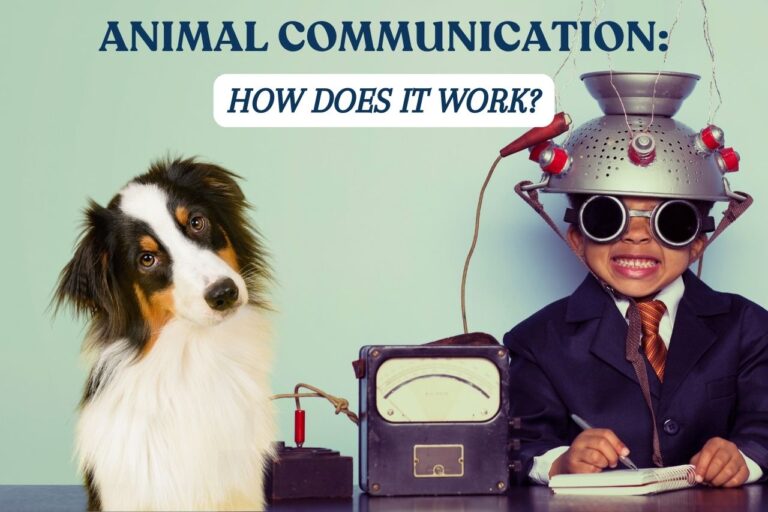Most pet parents experience dog behavioral issues at some point in their lives. These can appear at any stage of your pet’s life, during puppyhood, as an adolescent, and even in their senior years.
Animal communicators can help with common dog behavior issues including separation anxiety, fears and phobias, aggression, destructive chewing, excessive barking, resource guarding, mouthing, nipping or biting, excessive licking, OCD, and PTSD.
Animal communicators can help pet parents understand their pets and learn to communicate with them. These sessions do not replace veterinary care or the role of dog trainers and behaviourists, it complements them.
So, let’s dive right in. What are the 15 dog behavioral problems an animal communication can help solve?
1. Separation anxiety

Animal communicators can help dogs suffering from separation anxiety by acknowledging their feelings, easing their fears, and teaching them how to relax when they leave the house.
Since the lockdown, the amount of pets suffering from separation anxiety has rocketed. Our dogs were used to our homebound lifestyle and became emotionally, physically, and mentally dependent on us at all times.
But as we return to our pre-lockdown routines our dogs get emotionally triggered and cause a traumatic experience for them. Any type of traumatic event can cause anxiety and lead to separation anxiety.
Common signs your dog is anxious or in distress include excessive salivation, barking, house soiling, paw licking, tail biting, or breaking and destroying the house.
2. Excessive barking
Like us, dogs use verbal and nonverbal cues to communicate with other people, and animals and let us know how they are feeling. They may bark when they are excited, bored, surprised or startled, fearful, anxious, territorial in pain, or when suffering from canine dementia.
Animal communicators can find out the reason behind the barking, from the dog itself. Through this back-and-forth communication, we can negotiate ways to reduce the barking and provide alternative outlets for their expression.
3. Fears and Phobias
Fears and phobias can develop at any stage of our dog’s life. They can begin in their mother’s womb, inherit from their parents, lack socialization, or result from scary encounters.
During an animal communication session, we tune into the animal and sense their emotions and fears. This recognition and profound sharing almost instantly relax the animals as they know they are understood.
By listening to the dog’s fears, phobias, and concerns, we lift a huge weight off of their shoulders. It is the start of the healing process.
When Animal Communication sessions are coupled with desensitization and counterconditioning dog training, the fears and phobias start to melt away.
Note: In senior dogs, fears and phobias can develop due to pain, declining health, and neurological and cognitive dysfunctions. Animal communicators can assist pets express their needs but it is important to seek medical care from a trusted vet.
4. Post Traumatic Stress Disorder (PTSD)
Learning about our dog’s past experiences not only lets us know about all the things they love and enjoy doing, but it can also reveal past trauma.
This is particularly important when adopting rescue animals. We don’t know what they have gone through and we do our best to make them feel safe and comfortable. Animal communication sessions can help up pre-empt challenges, and discover what scares them or triggers their fear and anxiety.
By understanding their emotional baggage we can build their confidence, develop trust, and work on changing their negative experiences into positive ones. We don’t want to cause our dogs any further distress. The goal is to help our animals feel safe, happy, and supported in their new life.
5. Destructive chewing

Coming home to a house full of destruction can leave us in a state of shock, make us feel helpless, and make us fearful of leaving the house.
When destructive behavior happens many times, we can lose trust in our dogs. Over time this can have a negative impact on the bond between you and your dog.
That is why it is important to remember that destructive chewing is a coping strategy for our dogs to manage fear, phobias, stress, anxiety, and boredom, among others.
These behaviors rarely develop overnight. It usually escalates over time we just missed the subtle signs.
By working with an animal communicator you can learn how to telepathically send messages to your pets, sense their energy field, understand their thoughts, and feel their emotions.
During my animal communication session, I also teach my clients about canine body language and how to prevent destructive behaviors.
6. Mouthing, nipping and play biting
Dogs explore the world through their noses and mouths. Although most mouthing is considered normal behavior, it could be a sign of aggression.
We often misread our pets and send them the wrong messages.
So when should we worry about mouthing, nipping, and play-biting?
If you notice your dog mouthing, nipping, or play biting :
- When they are fearful or frustrated
- If they expose their teeth
- If their body gets stiff
- If the interaction is painful
- If they damage the skin and cause bleeding
If you experience any of the above, you should immediately book an animal communication session and a certified dog behaviorist. Our animals need to know that this behavior is inappropriate and teach them new ways of interacting.
7. Howling, whining or crying

Everyone who has ever had a dog companion knows that there are many types of barks, howls, whines, or cries. It can tell us when they are stressed, anxious, excited, scared, to set boundaries, to ask you to come back home, or because they have found something interesting.
Animal communicators can talk to our pets about undesirable behaviors and negotiate ways of reducing the howling, whining, or crying or find alternative responses that are mutually beneficial for the pet parent and their dog.
8. Sadness felt after losing a member of the family
Our pets love full-heartedly so it is no wonder that when a member of the family passes away they experience tremendous grief. Our Pets grieve and mourn their human and animal families and can find it difficult to cope with their emotions and intense feelings of sadness.
Animal communicators can support dogs in their moments of grief and help them unburden themselves from the pain and feelings of loneliness.
We can sense their pain and remain fully present so that they can work through their emotions and release the emotional baggage. Helping your dog return back to his usual confident self and no longer feel upset and alone?
9. Food guarding or resource guarding
Food guarding or resource guarding is where a dog appears to be possessive over their food, toy, or any other item they perceives as valuable.
An animal communicator can teach you how to telepathically communicate with your dog and reassure them of your actions. Helping them understand why you may need to remove their food, their toy, or limit time on the sofa.
In doing so, we can change the dog’s belief that humans approach them to remove the things they most enjoy and love. Instead of seeing human interaction as a punishment.
We use telepathic communication to let them know that running away, hiding under a chair, becoming defensive, growling, or even biting is not to their benefit. But actually quite the opposite.
10. Obsessive compulsive behaviours (OCD)
Just like us, our pets can experience Obsessive-compulsive behaviors. These are repetitive behaviors that compel our dogs to pace back and forth, chase their tails, fly snapping, chasing lights or shadows, incessant or rhythmic barking, eating dirt, excessive licking, flank sucking, or self-mutilate.
According to science, the cause of OCD is still unknown. There are many reasons why dogs may experience OCD. These include chronic stress, anxiety, and emotional exhaustion. and lack of physical and mental stimulation and arousal.
Vets usually run multiple tests to rule out any underlying health conditions. Whereas animal communicators look into the subtle energy body for any disturbances and help the dog relax and feel calm. This is coupled with the back-and-forth communication to see if there are needs, wants, or desires that have not been met.

Excessive licking in dogs can be a sign that your dog has allergies, inflammation, Irritable Bowel Syndrome (IBS), dry skin, parasites, dietary issues, infections, dental issues, cognitive issues, or is bored and seeking attention.
As always we should rule out any medical conditions contributing to the condition. Sometimes we may know about an allergy but not know what is causing it. We may not remember changing our cleaning detergents, or know that our regular food brand updated their ingredients or that they were exposed to chemicals while out on their walk. But our pets know much more than we realize.
12. Changes to the family dynamics
We all know that dogs are loyal and would do anything to make us happy. But sometimes things are too much for them to handle.
This is often the case when tension builds up at home. A new addition to the house such as a baby, another pet, or someone else moving in can put additional stress on our pets. They may struggle to adapt to the changes and may question their role in the home.
The same is true when a member of the family leaves the home, the kids move out, a breakup or divorce. Our dogs are left in limbo and feel confused about their role in the family. This confusion can lead dogs and cats to run away and seek a family elsewhere.
They didn’t want to run away, they just didn’t know how to deal with the conflict or the uncertainty. But we can support our animals through these changes by letting them know what is happening and reassuring them we still want them in our lives.

13. Dealing with up coming changes
Our animals are sensitive beings and can sense upcoming changes, as soon as we start thinking about them. They will know about your job promotion, a future home renovation project, an upcoming vacation, and even a relocation.
Our dogs want the best for us, but they also fear or worry about their importance moving down the scale. They know that your promotion means coming home late during the week and that their walks may get shorter.
They know that the renovation will result in builders coming and going and making a lot of noise. They know whether or not they will travel with you during your upcoming vacation. And they can get upset and moody about it.
But we can strike a balance, we can let our pets know that our routine will change, but that we will make it up to them. We can negotiate and find out what they would like in return. What would make them feel better so that the changes don’t stress or negatively impact them?
When our animal’s feelings are taken into consideration, they feel safe, valued, and loved.
14. Strange or unexplainable behaviours
All dogs are unique and have their own personalities and what is considered normal for one dog, may be completely out of character for another.
Noticing strange or different behaviors could be a sign that your dog is suffering in silence. They may feel sad, bored, unappreciated, depressed or stressed. They may remember a loved one who passed and feel an intense emotion of loss.
However, it is important to also rule out health-related issues such as an injury or illness that could be contributing to changes in behavior. Senior dogs may experience neurological problems that can lead to changes in behavior.
15. Digging holes
Some dogs have a natural predisposition to digging holes, these include huskies, malamutes, terriers, collies, beagles, and basset hounds. So finding a healthy outlet for their instinctual needs is extremely important.
Whereas, other dogs may find digging up the garden or backyard a form of entertainment, emotional therapy, comforting, attention seeking, and a way to escape feelings of stress, anxiety, or tension. Animal communicators can help us feel into your dog’s emotional state and discover what is fueling their impulse to dig holes.
Thank you for reading, I hope this blog post has revealed common dog behavioral problems that animal communicators can resolve.
What dog behavior issues have you experienced and would you consider booking an animal communication session to resolve this? Yes, Maybe, No?
Leave a comment below, I love hearing about your opinions and experiences.






